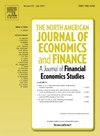Fiscal rules, inflation and monetary policy: International evidence
IF 3.8
3区 经济学
Q1 BUSINESS, FINANCE
North American Journal of Economics and Finance
Pub Date : 2025-05-27
DOI:10.1016/j.najef.2025.102472
引用次数: 0
Abstract
The relationship between fiscal rules and monetary policy, particularly their impact on interest rates, remains underexplored in international empirical literature. To address this gap, we examine whether adopting fiscal rules – and specific types of rules – enhances monetary policy flexibility, enabling lower interest rates. We also assess whether inflation serves as a transmission channel between fiscal rules and interest rates. Our study covers 82 countries (49 developing and 33 developed) from 1993 to 2019, analyzing the full sample and sub-samples based on economic development and inflation-targeting policies. We distinguish between national and supranational fiscal rules, as well as different rule types (debt, budget, expenditure, and revenue). The findings indicate that fiscal rules contribute to lower interest rates, with expenditure rules playing a crucial role across all samples. Budget rules also show significance. Additionally, inflation serves as a key transmission mechanism linking fiscal rules to interest rates.
财政规则、通货膨胀和货币政策:国际证据
财政规则与货币政策之间的关系,特别是它们对利率的影响,在国际实证文献中仍未得到充分探讨。为了解决这一差距,我们研究了采用财政规则(以及特定类型的规则)是否能提高货币政策的灵活性,从而降低利率。我们还评估了通货膨胀是否作为财政规则和利率之间的传导渠道。我们的研究涵盖了从1993年到2019年的82个国家(49个发展中国家和33个发达国家),分析了基于经济发展和通胀目标政策的全样本和子样本。我们区分了国家和超国家的财政规则,以及不同的规则类型(债务、预算、支出和收入)。研究结果表明,财政规则有助于降低利率,支出规则在所有样本中都起着至关重要的作用。预算规则也很重要。此外,通货膨胀是将财政规则与利率联系起来的关键传导机制。
本文章由计算机程序翻译,如有差异,请以英文原文为准。
求助全文
约1分钟内获得全文
求助全文
来源期刊
CiteScore
7.30
自引率
8.30%
发文量
168
期刊介绍:
The focus of the North-American Journal of Economics and Finance is on the economics of integration of goods, services, financial markets, at both regional and global levels with the role of economic policy in that process playing an important role. Both theoretical and empirical papers are welcome. Empirical and policy-related papers that rely on data and the experiences of countries outside North America are also welcome. Papers should offer concrete lessons about the ongoing process of globalization, or policy implications about how governments, domestic or international institutions, can improve the coordination of their activities. Empirical analysis should be capable of replication. Authors of accepted papers will be encouraged to supply data and computer programs.

 求助内容:
求助内容: 应助结果提醒方式:
应助结果提醒方式:


